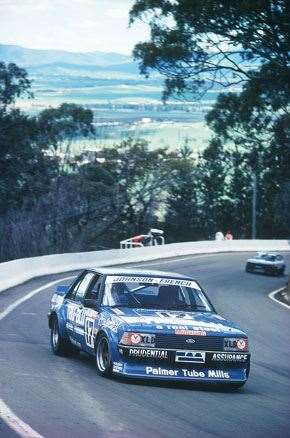James Smith recently caught up with Johnson at a Jim Beam Racing promo day at Eastern Creek and tried his best not to appear too starstruck.
 Victory was sweet for “Tricky Dicky” and John French a year later ... Image: Getty Images
Victory was sweet for “Tricky Dicky” and John French a year later ... Image: Getty ImagesLooking back, what were your best qualities as a race driver?
“One of the best qualities I had was being compassionate about what parts of the car were vulnerable … The brakes – for the weight of the car – were very small and inadequate, for example. Over a long distance you had to really look after the brakes so you’d finish the race. Something my Dad always taught me was ‘to finish first, first you must finish’. That was always in the back of my mind. I was very kind to the car in many ways.“It was also a matter of being self-critical without being stupid. The one thing I never ever did was feed off the bullshit, the media hype. I knew what I could achieve and what I couldn’t achieve, and I never stepped over that line.”
What’s it like rounding a blind right-hander at Bathurst, finding a tow truck in your way, trying to avoid it, only to smack into a boulder sitting in the middle of the track (1980)? Did you ever find out how “the rock” got there?
“It’s the best worst thing that ever happened to me. I can honestly say I know exactly how it got there. About 12-18 months ago – I still have the email – this guy, who was a resident of Mt Panorama at the time, wrote to me. That day, he and his wife were sitting on the hill where it happened. There were no spectators within 50m either side of them. He said these two other guys, who had obviously been out all night and were feeling a little bit average, were walking up past them and the only reason they noticed them was the fact that out of everywhere they could’ve gone, they sat down right in front of these two people. One of them laid down with his feet resting on a rock – which was about the size of a soccer ball – and unfortunately he dislodged it, it rolled down the hill and fell onto the race track. In his email he said once this had happened, the two blokes took off at 100 miles an hour. It was never intentional, and I never thought for a moment it was.”
The support you received from fans immediately after was amazing, right?
“At the time, flashing before my eyes was, ‘I’ve mortgaged the house, I’ve screwed up … ’ But as the day unfolded, with Channel Seven being inundated with calls on their switchboard from people wanting to donate money and help, I thought, ‘This is really starting to turn into a positive here.’ After so many years of trying to get into the big-time, this was our opportunity. It was the most humbling experience you could ever imagine. You get to the point where you think, ‘Gee, a lot of people do care.’ The next 12 months were probably the toughest I’ve ever had and the most pressure I’ve ever felt, having gained the support of all those people, including Ford Australia, who matched everything dollar for dollar. The mail van used to back up to the house with bags and bags of letters, which was incredible.” (Johnson won the race the following year.)
Should the popular V8 curtain-raiser to the F1 Grand Prix at Albert Park be included in the championship?
“Absolutely, but we need to be able to use a separate pit area somewhere where we can operate like we do at other race meetings. There’s no way we can have a proper race meeting and be part of the F1 circus in the conditions we have currently. The thing that really kills us is the facilities in pit lane. It’s that tight, it’s almost dangerous.There’s no way we could do pitstops – it would be a nightmare.”
You raced in NASCAR for a short time. What are your thoughts on Marcos Ambrose’s prospects in the US?
“He’s really starting to get the gist of the game. NASCAR is completely different to our type of racing. It’s a different discipline to understand how to handle an oval track. The types of car – even though they physically look similar to ours; the size of the wheels and tyres and the overall weight – are completely different. It becomes very difficult for someone to adapt to that. It’s more of a speedway background than a circuit background. Marcos has done a remarkable job. He’s really starting to earn his place. He’s finishing in good positions quite often. He’s got the ability to do it, it’s just a matter of adapting to it all and working with people he hasn’t worked with before.”
How do you rate Dick Johnson as an everyday, regular road user?
“I’m very mindful of what’s happening around me. I probably concentrate as much on the road as what I used to on the race track. I get very disappointed in people who have no idea of what they’re doing or what’s happening around them. You can see they’re going to have an accident before they have it. I can read the road surface … I can drive along freeways, anywhere you like, and I can tell you with a 90 per cent success rate exactly what every person’s going to do before they do it. And that’s what driving’s all about. You have to anticipate what other drivers are going to do, so you’re not surprised by their moves or when they change lanes. This is what I tell kids.”
Related Articles
.jpeg&h=172&w=306&c=1&s=1)
Langerak to bolster Victory's ALM title bid in January

Socceroo-in-waiting seals Championship deal













